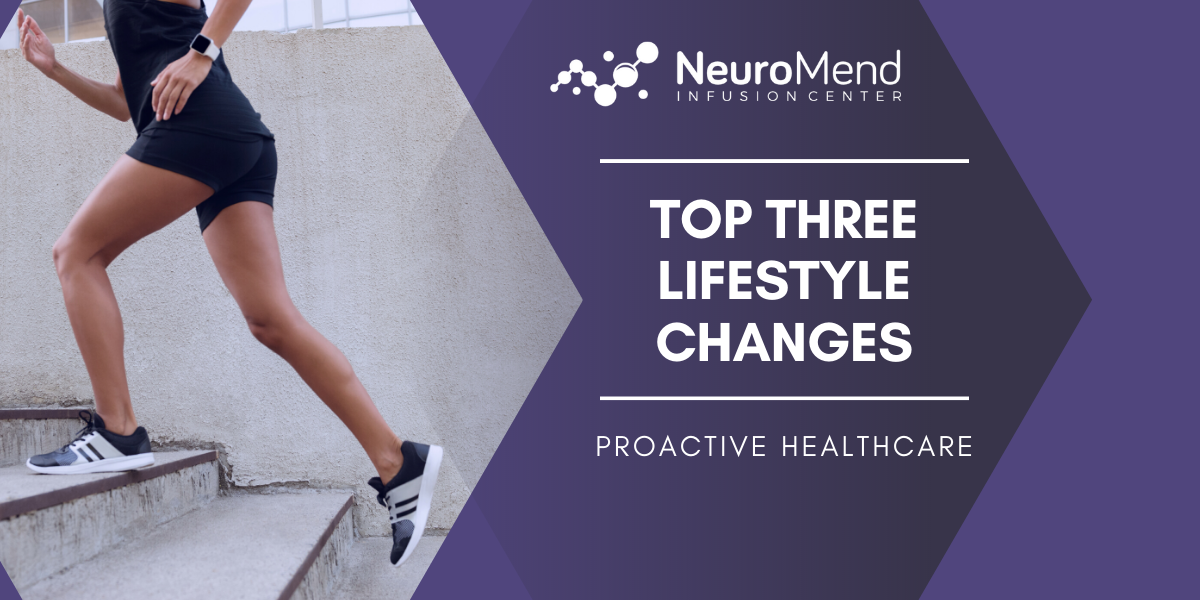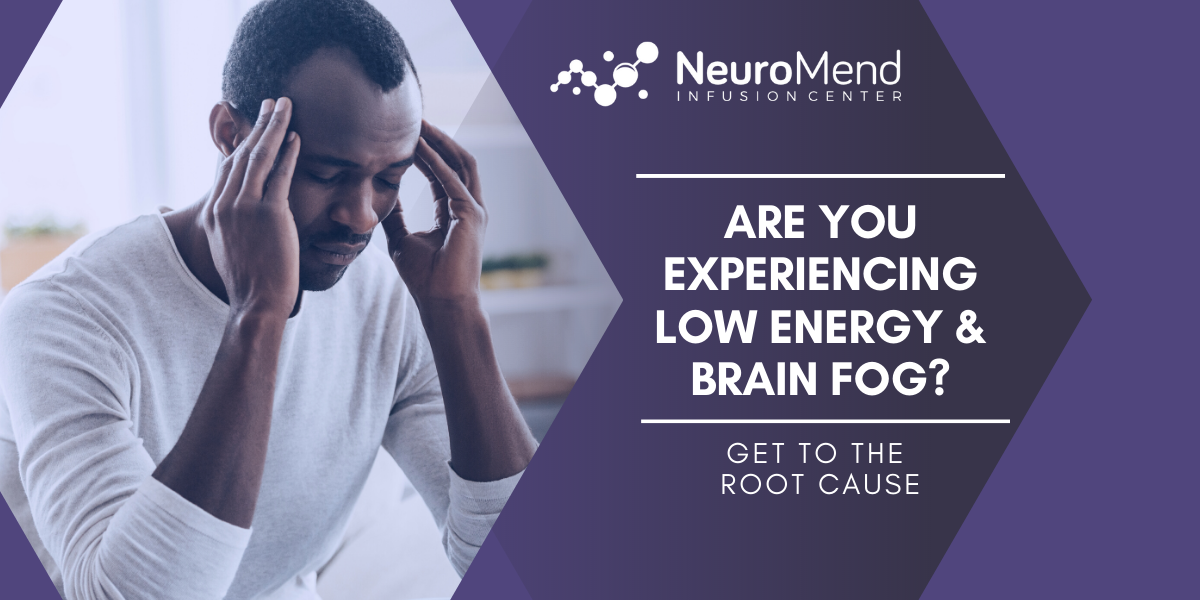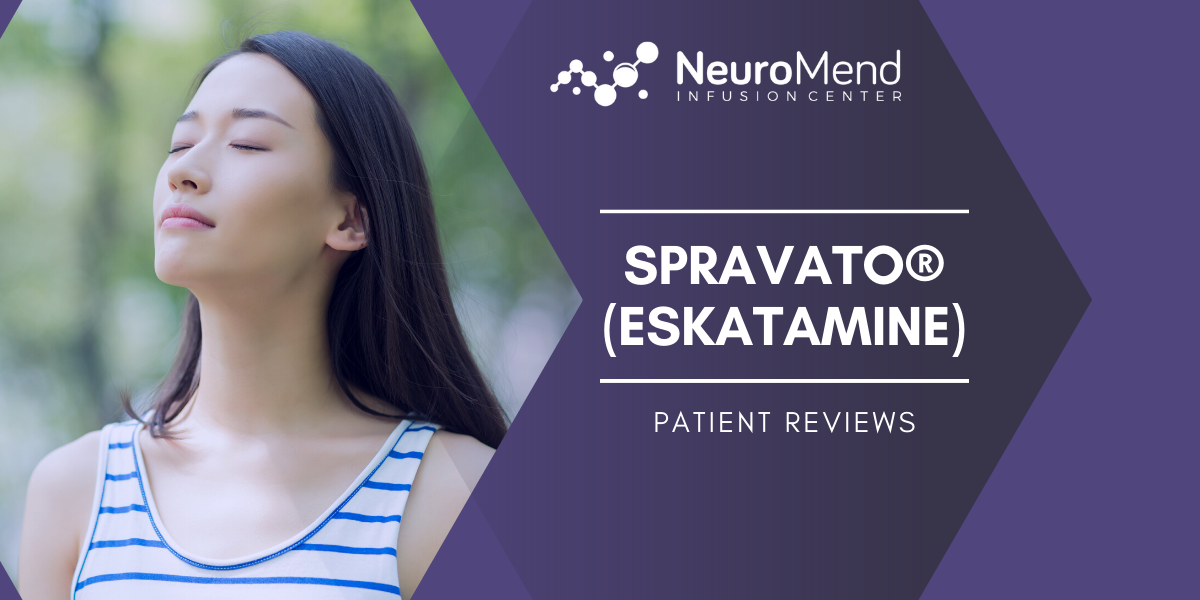
Health goes beyond just simply taking medication! It's often needed to help in addition to many of the offerings we provide at Neuromend and Drip IV. However, find out the top three lifestyle changes we recommend for you to be proactive with your health and empower healthy habits! So what's the secret to optimal wellness? Here's our top three recommendations: Sleep, Stress Management, and Exercise.
Sleep
Getting enough sleep is important in keeping your mind and body healthy.
Sleep affects both mental and physical health
Our lives can have many demands of our time. We have jobs, families, errands to run, extracurriculars, and somehow fitting time in to relax. We hear so often that getting enough sleep is important. This isn't only about total hours of sleep, but also getting good quality sleep. Getting enough sleep isn’t only about total hours of sleep.
Sleep is vital to your well-being.
Of course, sleep helps you feel rested each day. But while you’re sleeping, your brain and body don’t just shut down. With good sleep, your body is positively affected and can function at an optimal level. According to sleep experts, sleep services all aspects of our body in one way or another: molecular, energy balance, as well as intellectual function, alertness and mood.
When you’re tired and lack sleep, you aren't able to function at your best. Think about it, have you ever noticed how much better you operate on a day you got more sleep than on a day you didn't sleep well or long? It's a fact that sleep helps you think more clearly, have quicker reflexes and focus better.
Lack of sleep impairs your higher levels of reasoning, problem-solving and attention to detail. You can most likely be less productive at work, at a higher risk to be involved in accidents, or negatively influencing your mood, which can over time, put you at risk for developing depression.
So while sleep is essential for the brain, it is affects almost every tissue in our bodies. Sleep affects your immune system, blood pressure, breathing, appetite, growth and stress hormones, and cardiovascular health.
While you sleep, your heart rate, breathing rate, and blood pressure rise and fall. This is important for your cardiovascular health. Your body releases hormones that help repair cells and control energy usage in your body while you sleep. These hormone changes can affect weight gain
Research shows that lack of sleep increases the risk for obesity, heart disease and infections. Throughout the night, your heart rate, breathing rate and blood pressure rise and fall, a process that may be important for cardiovascular health. Your body releases hormones during sleep that help repair cells and control the body’s use of energy. These hormone changes can affect your body weight and even lead to diabetic-like conditions in healthy people.
WHat is a good night's sleep?
A good night’s sleep consists of 4 to 5 sleep cycles. Each cycle includes periods of deep sleep and rapid eye movement (REM) sleep, when we dream.
As the night goes on, the portion of that cycle that is in REM sleep increases. It turns out that this pattern of cycling and progression is critical to the biology of sleep.
Although personal needs vary, on average, adults need 7 to 8 hours of sleep per night. Babies typically sleep about 16 hours a day. Young children need at least 10 hours of sleep, while teenagers need at least 9 hours. To attain the maximum restorative benefits of sleep, getting a full night of quality sleep is important. - Twery.
Sleep can be disrupted by many things. Stimulants such as caffeine or certain medications can keep you up. Distractions such as electronics—especially the light from TVs, cell phones, tablets and e-readers—can prevent you from falling asleep.
As people get older, they may not get enough sleep because of illness, medications or sleep disorders. By some estimates, about 70 million Americans of all ages suffer from chronic sleep problems. The 2 most common sleep disorders are insomnia and sleep apnea.
Insomnia can trigger serious daytime problems such as exhaustion, irritability and difficulty concentrating.
Good sleep is one of the three lifestyle changes that are critical to good health.
Stress Management
Let's face it, we all face stress of some sort daily. Most of these little stresses are temporary and not considered bad. It's when the stress becomes a long-term problem that causes concern for your well being.
Chronic stress triggers the production of cortisol and hormones that activate the "fight or flight" response. These hormones surge through your body and block the production of immune cells in the immune system. These hormones can also disturb normal sleep patterns and cognitive functions in the brain.
Managing and preventing long-term stress can lower risk for other conditions like high blood pressure, depression, heart disease, and obesity. Not all stress is bad. But long-term stress can lead to health problems.
Prevent or reduce stress by:
- Planning ahead
- Meditating
- Mind focusing exercises
- Prioritizing tasks
- Preparing for stressful situations you can't avoid
Some stress is inevitable. Manage stress by:
- Noticing when you feel stressed
- Taking time to relax and breathe
- Getting active
- Eating healthy
- Talking to family or a friend
Stress management is one of our three steps in practicing proactive health.
Exercise
The last piece of the lifestyle changes that will lead to better health is exercise. Yes, we all know exercise is great for your body, but it serves a greater purpose! Exercise can also boost your mood, improve your sleep, relieve stress, depression, stress, and anxiety.
Mental health benefits of exercise
Exercise is such a powerful remedy for many common mental health issues. You can learn to use exercise to improve your energy and get more out of life.
Studies have shown that exercise can treat mild to moderate depression as effectively as antidepressant medication without the side effects. Maintaining an exercise regimen can prevent you from going back into a state of depression.
Exercising releases endorphins, which are those powerful chemicals in your brain that energize your spirits and make you feel all kinds of good. It serves as an effective treatment for anxiety relieving tension and stress, boosting physical and mental energy, and enhances well-being through the simple release of endorphins.
Do you ever feel just 'blah' when you're stressed? You may get headaches or muscle tension throughout your body. Some even feel tightness in their chest or muscle cramps. Your muscles may be tense, especially in your face, neck, and shoulders, leaving you with back or neck pain, or painful headaches. Thinking about and feeling the discomfort of these physical symptoms can cause even more stress creating a creating an unwanted cycle between your body and mind.
You can break this cycle with exercise! Getting active will not only release endorphins in the brain but also help relieve the tension in your body.
Your body and mind are so closely connected, so when your body feels good, your mind feels good!
Other mental health benefits of exercise
Even if you do not suffer from a mental health issue, exercise is so great for your well being. Exercise can improve your aerobic capacity, physical health, physique, and add years to your life. But what really motivates most people to exercise regularly?
People who stay active do it because of the strong sense of well-being it gives them. They get better sleep at night, feel more energetic throughout their day, have sharper thinking and memory, have higher self esteem, and get a boost to their overall mood.
Bonus tip: Small Changes for Big Results
Proactive health choices don't stop at lifestyle changes—your diet can also make a huge impact. For example, incorporating nutrient-dense options like picual oil into your meals can support overall wellness. Packed with healthy fats and antioxidants, it promotes better metabolism and reduces inflammation, aligning perfectly with a proactive approach to health.
Curious about picual oil’s unique benefits? Check out our full guide here.
Make the change
Now you have all the reasons why we recommend this awesome trio to be proactive with your health. A mix of quality sleep, stress management, and exercise is the recipe for optimal wellness. At NeuroMend, we will ensure you receive all the help we can offer to be your best self!
Contact Us
We care about your well being. Contact us for more information about our offerings or schedule a free consultation with us.
Disclaimer: As of September 29, 2023, NeuroMend no longer offers Spravato treatments. We apologize for any inconvenience and encourage you to consult with our team or your healthcare provider for alternative options.
ABOUT NEUROMEND INFUSION CENTER
 We are an Evidence-Based Center of Excellence and the leading provider of Ketamine Infusions, IV Infusions and Ketamine Consulting Services for Ketamine Clinics and IV Therapy Clinics.
We are an Evidence-Based Center of Excellence and the leading provider of Ketamine Infusions, IV Infusions and Ketamine Consulting Services for Ketamine Clinics and IV Therapy Clinics.
We Provide Effective Treatment For The Following Conditions: Major Depressive Disorders, Post-traumatic Stress Disorder (PTSD), Bipolar Depression, Obsessive Compulsive Disorder (OCD), Chronic Migraines, Severe Anxiety, Fibromyalgia and Chronic Pain Syndromes










